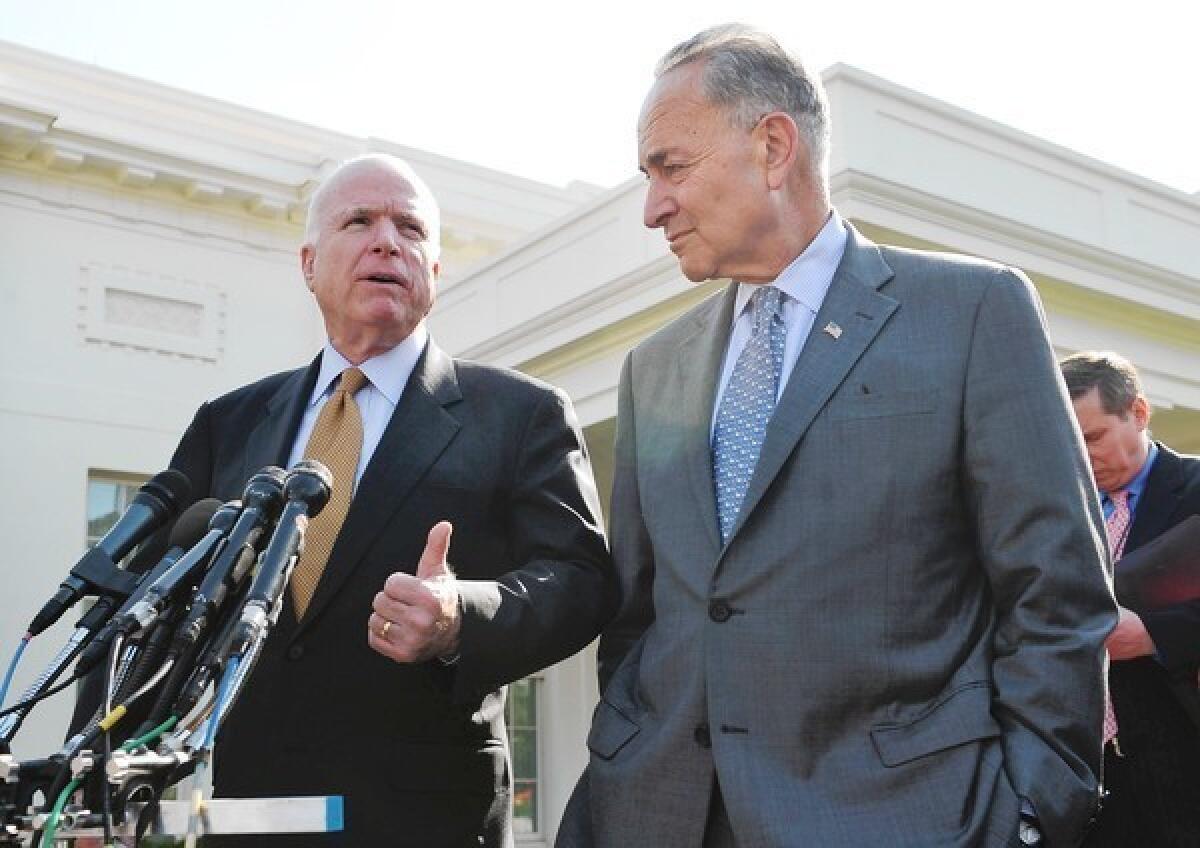Senate immigration bill looks promising despite some unease

- Share via
WASHINGTON — Complete satisfaction with the Senate’s bipartisan immigration proposal was hard to find Tuesday as details of the bill became known, but despite reservations, a growing consensus was developing in favor of the proposal as the best chance in a generation to achieve comprehensive immigration reform.
Republicans, in particular, largely held their fire on the issue, as the party’s elected officials warmed to the prospect of getting more resources for border security in exchange for a path to legal status for the 11 million immigrants living in the U.S. without legal authorization.
President Obama, after meeting at the White House with two of the bill’s top architects, Sen. John McCain (R-Ariz.) and Sen. Charles E. Schumer (D-N.Y.), pledged to “do whatever it takes” to achieve an immigration overhaul.
“This bill is clearly a compromise, and no one will get everything they wanted, including me,” Obama said as he urged the Senate to move quickly on the measure. “But it is largely consistent with the principles that I have repeatedly laid out for comprehensive reform.”
U.S. immigration law: Decades of debate
The top Republican in the Senate, Minority Leader Mitch McConnell of Kentucky, was eager to engage.
“Hopefully it’ll provide a bipartisan way forward on a very important issue to the country,” McConnell said.
Supporters expected to formally introduce the bill late Tuesday, with committee proceedings to begin this week. The goal is to get a bill to the Senate floor by summer.
The legislation would overhaul the nation’s often dysfunctional immigration system. It would require a politically delicate exchange of priorities between the two parties that would play out over the next decade.
Republicans have long advocated beefing up security along the Southwestern border with a double-layer fence and enhanced surveillance. The bill would advance that goal.
Democrats would get what they’ve proclaimed as a top priority: a path to citizenship for most of the 11 million people who entered the country illegally or overstayed their visas. They could obtain legal status and become eligible for citizenship after payment of back taxes, $2,000 in fines and a 13-year wait.
The bill also would transform the nation’s visa system to clear the backlog of 4 million people awaiting reunification with family members in the U.S. and accommodate new guest worker programs. A new W visa would allow in as many as 200,000 low-skilled house cleaners, landscapers and workers in other occupations over the decade; a merit-based visa would welcome as many as 120,000 “talented” foreigners.
PHOTOS: The debate over immigration reform
Farmworkers would be provided an expedited five-year path to legal status if they committed to working that long in the fields. So-called dreamers — young people in college or the military who were brought to the U.S. as minors — could achieve legal status within five years.
Within five years, every employer would be required to verify the legal status of newly hired workers with an enhanced electronic verification system — a crucial feature for winning GOP support.
Democrats, particularly liberals, grumbled over the $5 billion for enhanced border security and fencing, as well as the shift away from family visas in favor of work-related immigration.
“There are some pills that need to be swallowed that are not very comfortable for me and other members of Congress,” said Rep. Raul M. Grijalva (D-Ariz.), co-chairman of the Congressional Progressive Caucus.
“Border security isn’t border security; it’s border militarization,” said Maria Fernanda Cabello, a field organizer for the advocacy group United We Dream in Houston. “And it’s harming and terrorizing our communities. The border is more secure than ever before. It’s time for citizenship for our families.”
Conservative stalwarts, led by Sen. Jeff Sessions (R-Ala.), argued that the new guest worker programs would take jobs from Americans and create a future wave of residents who overstay their visas.
But Republican senators largely avoided hardened positions. Many of them consider the bill crucial to the GOP’s outreach to Latino voters, who voted against the party in large numbers during the last election.
“I think that they have made a good-faith effort to find agreements that are very responsible considering the wide divergence of opinions,” said Sen. Charles E. Grassley of Iowa, the top Republican on the Judiciary Committee.
Republican Sen. Mike Johanns of Nebraska called legal status for the 11 million people a “tough lift,” but did not say no. “I’m open to the bill,” he said. “Obviously, the current system is a mess.”
Brian Bennett in the Washington bureau contributed to this report.
More to Read
Sign up for Essential California
The most important California stories and recommendations in your inbox every morning.
You may occasionally receive promotional content from the Los Angeles Times.












